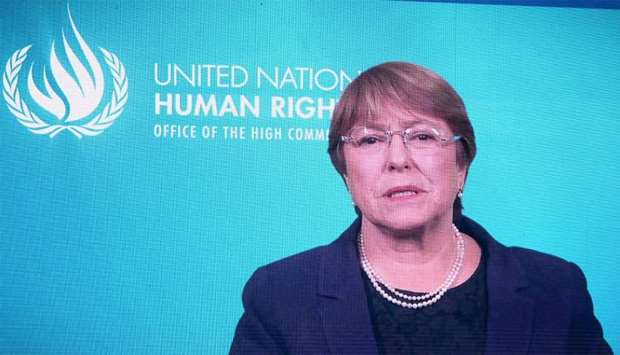United Nations High Commissioner for Human Rights Michelle Bachelet has said the vast and diverse experiences discussed at the "International Conference on National, Regional and International Mechanisms to Combat Impunity and Ensure Accountability under International Law", held in Doha, speak to one undeniable fact, that achieving accountability and ending impunity must be a priority for the international community.
She added, "Societies that undergo conflicts or face authoritarian regimes must have their grievances addressed. We, in our office, receive first-hand accounts of men, women and children who have been subjected to the most horrific crimes: massacres, torture, sexual violence, displacement, starvation, denial of access to basic medical care and to education. We can do more to bring the perpetrators of these crimes to justice and to protect the victims."
"Victims have a right to truth, justice and reparation. This is important not only to the victims themselves but for societies as a whole to attain sustainable peace and reconciliation," she added.
She said, "While the road towards justice may be fraught with challenges, it remains indispensable for societies to truly heal. Various experiences have demonstrated that without justice, peace remains an illusion. Asserting accountability and countering impunity are preconditions to sustainable peace."
She explained that there are three essential aspects in tackling the issue of accountability, which are the need to consistently consider accountability in a comprehensive manner, to encourage further reflection on the synergies between accountability and prevention. The synergies which are mirrored in the Sustainable Developments Goals, including Goal 16 on peaceful, just and inclusive societies. Finally, the need to look at the root causes of conflicts, which are often grounded in systemic inequalities and discrimination as well as social exclusion.
She added that accountability is a key strategy in the High Commissioner office with particular emphasis on strengthening justice mechanisms. Underpinning of this approach is simple: by promoting justice and remedies for past violations using preventive action through mapping and reporting on human rights violations may effectively contribute to non-recurrence, she explained.
She said that she believes in the important role of national human rights institutions in the Arab world and welcomed her office's co-operation with the Arab Network for National Human Rights Institutions.
She also thanked the National Human Rights Committee in Qatar for hosting and organising the event, wishing them utmost success in the conference.

